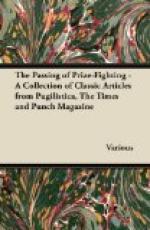No one can suspect PUNCH of any prestige in favour of the restrictions laid upon the drama—for our own free-and-easy habit of erecting our theatre in the first convenient street we come to, and going through our performance without caring a rush for the Lord Chamberlain or the Middlesex magistrates, must convince all who know us, that we are for a thoroughly free trade in theatricals; but, nevertheless, we think the Great Unactables talk egregious nonsense when they prate about the possibility of their efforts working “a beneficial alteration in a law which presses so fatally on dramatic genius.” We think their tom-foolery more likely to induce restrictions that may prevent others from exposing their mental imbecility, than to encourage the authorities to relax the laws that might hinder them from doing so. The boasted compliance with legal requisites in the mode of preparing “Martinuzzi” for the stage is not a new idea, and we only hope it may be carried out one-half as well as in the instances of “Romeo and Juliet as the Law directs,” and “Othello according to Act of Parliament.” There is a vaster amount of humbug in the play-bill of this new concern, than in all the open puffs that have been issued for many years past from all the regular establishments. The tirade against the law—the announcement of alterations in conformity with the law—the hint that the musical introductions are such as “the law may require”—mean nothing more than this—“if the piece is damned, it’s the law; if it succeeds, it’s the author’s genius!” Now, every one who has written for the illegitimate stage, and therefore PUNCH in particular, knows very well that the necessity for the introduction of music into a piece played at one of the smaller theatres is only nominal—that four pieces of verse are interspersed in the copy sent to the licenser, but these are such matters of utter course, that their invention or selection is generally left to the prompter’s genius. The piece is, unless essentially musical, licensed with the songs and acted without—or, at least, there is no necessity whatever for retaining them. Why, therefore, should Mr. Stephens drag “solos, duets, choruses, and other musical arrangements,” into his drama, unless it is that he thinks they will give it a better chance of success? while, in the event of failure, he reserves the right of turning round upon the law and the music, which he will declare were the means of damning it.
A set of briefless barristers—all would-be Erskines, Thurlows, or Eldons, at the least—might as well complain of the system that excludes them from the Woolsack, and take a building to turn it into a Court of Chancery on their own account, as that these luckless scribblers, all fancying the Elizabethan mantle has fallen flop upon their backs, should set themselves up for Shakspeares on their own account, and seize on a metropolitan theatre as a temple for the enshrinement of their genius.




